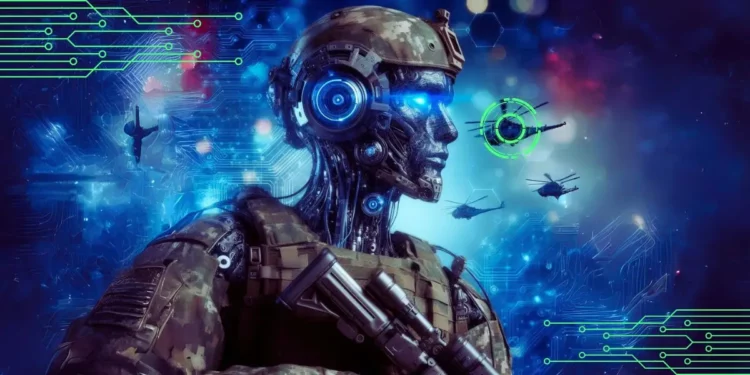In a recent interview, former Google CEO Eric Schmidt painted a chilling picture of the potential future of artificial intelligence (AI) in the military realm. Schmidt envisions a scenario where military bases house high-powered AI systems powered by nuclear energy and guarded by automated weapons.
AI Arms Race: US and China at the Forefront
Schmidt predicts that the United States and China will lead the development of these advanced AI systems, capable of autonomous invention beyond the reach of ordinary citizens. The goal is to keep these technologies out of the hands of international competitors. Schmidt emphasizes the need to protect these systems with safeguards, nuclear power, and armed defenses.
The Perils of Uncontrolled AI
Schmidt also warns of the dangers of uncontrolled AI. A particularly concerning scenario would be an AI in China gaining access to a weapon and deploying it without understanding the consequences. This situation is exacerbated by the lack of human experience in AI decision-making.
AI’s Role in the Military
The integration of AI into military operations is already a reality. Recently, the US Air Force successfully tested an AI-controlled fighter jet in combat simulations against human pilots. These tests have sparked debates about the ethical boundaries of AI use in the military. The US has pledged not to put AI in control of nuclear weapons systems and has urged China and Russia to follow suit.
Technological Restrictions and Rivalries
To curb China’s progress in AI, the US continues to impose restrictions on the export of advanced AI chips. In response, China is seeking to reduce its reliance on US technology. One example of this technological rivalry is China’s refusal to sell the TikTok algorithm, classified as restricted technology since 2020.
Eric Schmidt’s Vision for the Future
Since leaving Google in 2020, Eric Schmidt has invested in AI startups and co-authored a book titled “The Age of AI: And Our Human Future.” The book explores how AI technology is transforming society and the potential risks it carries.
Schmidt’s vision of the future of AI in military bases invites us to reflect on the ethical and geopolitical challenges posed by this technology. The idea of AI systems powered by nuclear energy and protected by weapons highlights the need for a global debate on the development and use of these technologies.
Schmidt’s Background
Schmidt served as CEO and chairman of the board of Google from 2001 to 2011 before handing over the reins to co-founder Larry Page. He later served as executive chairman and technical advisor to the search giant before finally leaving the company in early 2020. Since then, the 69-year-old Schmidt has taken an interest in AI and studying its impact on society. He co-authored the book “The Age of AI” with the late diplomat Henry Kissinger and MIT Dean of Computer Science Daniel Hattenlocher. In it, he details the risks and opportunities that AI will bring.
Conclusion
While it may seem far-fetched now, Schmidt’s prediction could become a reality given the competitiveness of countries in maintaining leadership in the AI race. The US has recently tightened controls on its tech exports to China, limiting sales of AI chips made by companies like NVIDIA.
The same can be said for China, which is working to minimize its reliance on US-made chips. Chinese authorities are mandating domestic tech giants like Alibaba and ByteDance, the parent company of TikTok, to buy locally produced AI chips.
FAQs
What is Eric Schmidt’s vision for the future of AI in warfare?
Eric Schmidt envisions a scenario where military bases house high-powered AI systems powered by nuclear energy and guarded by automated weapons. He believes that the US and China will lead the development of these advanced AI systems, which could pose significant ethical and geopolitical challenges.
What are the potential risks of uncontrolled AI in warfare?
Uncontrolled AI in warfare could lead to autonomous weapons systems that make decisions without human intervention, potentially resulting in unintended consequences and loss of life. Additionally, the lack of human experience in AI decision-making raises concerns about accountability and the potential for misuse.
What is the current state of AI integration in the military?
The integration of AI into military operations is already underway, with examples like the US Air Force’s successful testing of an AI-controlled fighter jet. However, these advancements have sparked debates about the ethical boundaries of AI use in the military, leading to pledges from the US to avoid AI control of nuclear weapons systems.
What are the technological restrictions and rivalries surrounding AI development?
To curb China’s progress in AI, the US has imposed restrictions on the export of advanced AI chips. In response, China is seeking to reduce its reliance on US technology, as evidenced by its refusal to sell the TikTok algorithm and its mandate for domestic tech giants to use locally produced AI chips.
What are the ethical and geopolitical implications of Schmidt’s vision of AI in warfare?
Schmidt’s vision raises concerns about the potential for AI to exacerbate existing tensions and conflicts between nations, particularly in the context of nuclear weapons. It also highlights the need for international cooperation and dialogue to establish clear guidelines and regulations for the development and use of AI in military applications.
Twitter Linkedin Facebook Telegram Instagram Google News Amazon Store











































